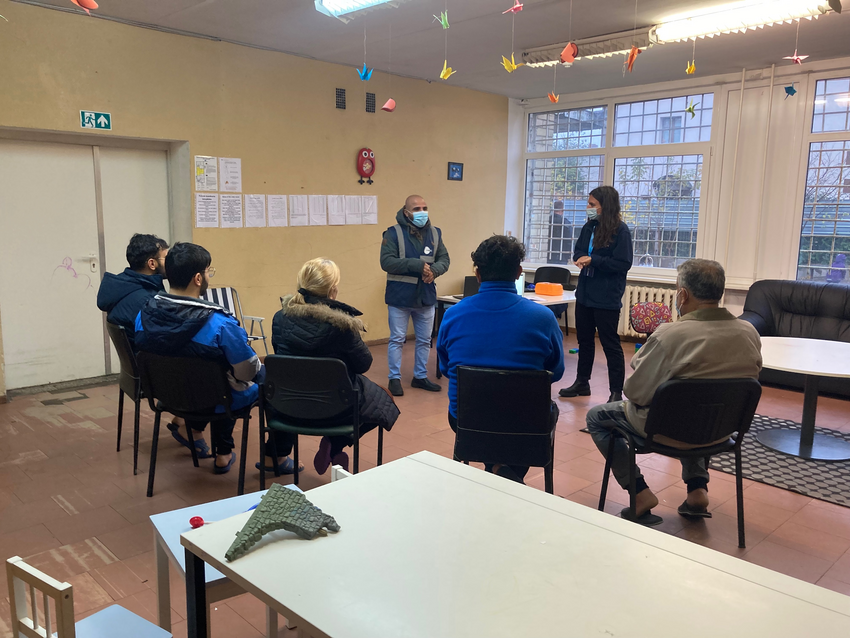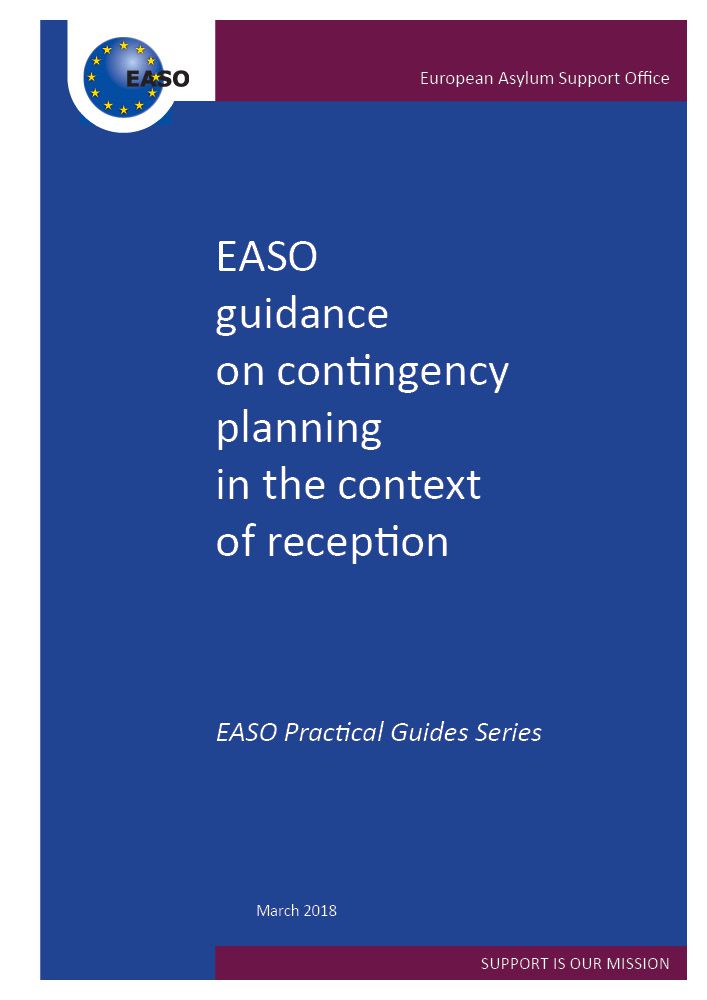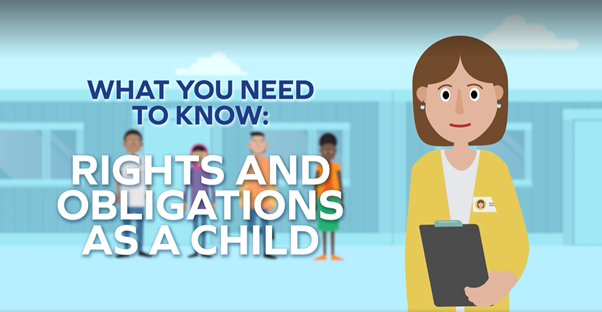The EUAA supports EU and associated countries in improving quality and efficiency in the area of reception. This includes the reception process flow and reception conditions in the framework of Common European Asylum System (CEAS). The network approach serves to promote convergence in the application of the CEAS in the area of reception by way of practical cooperation and information exchange among EU and associated countries, identification of national reception needs and the pooling of expertise for the development of practical tools, guidance and standards based on common and good practices across the EU.
Vision on reception
Reception plays a fundamental role in the efficient implementation of the CEAS. It concerns the provision of accommodation to applicants throughout the duration of the asylum procedure. While temporary in nature, reception facilities are not merely a space of temporary placement providing material reception conditions. Reception facilities are at the crossroad between the asylum procedure and what comes next - integration, relocation to another Member State, or return.
The Strategy on Reception adopted by the Management Board during its 38th Meeting on 18 March 2021, provides a framework to enhance the EUAA’s capacity to respond to the challenges faced by EU and associated countries in the area of reception of applicants for international protection, through permanent technical support, training and operational interventions in EU countries as well as in third countries along the migratory route.
The strategy follows a scenario-based intervention logic, which is further elaborated applying an extensive range of building blocks based on EUAA standards and indicators on reception, including processes, procedures and standards; monitoring and reporting quality management coordination; governance and access to special needs of vulnerable persons.
EUAA’s network approach - EUAA Network of Reception Authorities
The EUAA Network of Reception Authorities aims to foster the exchange of knowledge, information and good practices in the management and process flows in the reception systems across EU and associated countries. Facilitated by the EUAA, the network promotes practical cooperation and the development of operational standards, guidance, and practical tools to support EU and associated countries in the convergence of quality standards in reception in the framework of the CEAS.
The network of reception authorities produces diverse activities.
- Biannual national contact point meetings to discuss challenges, identify needs and agree on priorities for the EUAA’s involvement.
- Thematic meetings on topical issues, identified by the network to discuss gaps and good practices across the EU
- High-level meetings for senior managers and directors of reception authorities to exchange views on strategic and managerial issues.
- Exchange visits and thematic workshops for reception practitioners on themes to trigger practical cooperation and capacity building among peers.
- Workshops with selected national experts for the development of practical tools and guidance.
- Development, promotion, and support for the implementation of practical tools and guidance.
Practical tools and guidance
- Site and Building Assessment Tool New
- Guidelines on Alternatives to Detention
- Modular Approach to Reception: Container site designs
- Private accommodation for persons displaced from Ukraine
- Guidance on reception conditions: operational standards and indicators
HTML version available here. - Guidance on reception conditions for unaccompanied children: operational standards and indicators
HTML version available here. - Guidance on contingency planning in the context of reception
- Assessment of Reception Conditions Tool.
Support to operations
The EUAA provides expert and technical support in the area of reception to Member States where EUAA operational support is extended.
During the past years, the EUAA has offered support to Greece, Cyprus, Spain, Italy, Malta in several areas, and more recently to Lithuania and Latvia.
Support has been provided on:
- The Development of national reception strategies;
- Standards and self-assessment of reception conditions in accommodation facilities, including the roll-out of the EUAA Assessment of Reception condition tools;
- Emergency support;
- The implementation of first and second-line quality monitoring framework;
- Information provision, including development of information package and appropriate dissemination tools;
- Reception processes.

Info-session on scabies carried out by Operations in Naujininkai centre (Vilnius) Lithuania
Photo credits: EUAA
Reception conditions and standards
Building reception systems in EU and associated countries is key in addressing the needs of applicants. Establishing harmonised reception conditions across EU and associated countries is paramount for a strong European asylum system. The development and implementation of strong monitoring systems is crucial to keep achieving and maintaining high-quality reception conditions.
The EUAA develops guidance, conducts thematic meetings, and provides technical support to assist EU and associated countries in addressing differences in the setup and modalities for provision of reception conditions.
The Guidance on reception conditions: operational standards and indicators (2016) provides support to Member States in the implementation of the key provisions of the Reception Conditions Directive (2013/33/EU) and serves as a tool to support reception authorities in planning and in running of reception facilities.
The Guidance on reception conditions for unaccompanied children: operational standards and indicators (2018) provides standards and indicators addressing the special reception needs of unaccompanied children.
The EUAA also developed an IT application for self-Assessment of Reception Conditions (ARC) to assist Member States in the assessment of their own centres and reception systems. The tool is publicly available at the following link https://arc.euaa.europa.eu/ and in the following languages: English, Greek, Italian, Romanian and Spanish. In the coming months, the ARC tool will be translated in all the EU languages.
The EUAA has organised meetings and workshops, developed guidance, and delivers operations support and capacity building in third countries to build flexible reception systems, allowing upscaling or downscaling according to the changing environment.
Guidance on Contingency Planning

The Guidance on contingency planning in the context of reception (2018) proposes actions that reception authorities should take before, during and after a high-influx situation. It uses an integral approach to contingency planning, including cooperation with state / non-state actors contributing to reception.
Arrival centres
In providing support to EU and associated countries, the EUAA approaches reception as a process that involves the design and management of various workflows and procedures across the three reception phases of arrival, stay and end. A well designed and managed reception process is a guarantee for a well-functioning reception facility where inflow and outflow as well as the asylum chain are efficiently managed, and applicants are provided with high-quality standards.
To support EU and associated countries in implementing an integrated approach in the management of arrival centres, the EUAA conducts thematic meetings and exchange programmes.
The EUAA conducted a thematic meeting on the impact of long stays in reception (October 2019, Brno) to examine trends, challenges and possible solutions found at local (reception centre) and national (reception authority) levels. It also organised an online thematic meeting on the design and operation of arrival centres in June 2021.
The EUAA also organised an exchange programme and visit of EU and associated countries to Norway on the topic of long stays in reception (September 2019). EASO also organised an exchange programme with visits of EU and associated countries (April 2019) to arrival centres in Slovakia and the Netherlands.

Exchange programme on arrival centre, Slovakia (2019)
Photo credits: EUAA
Pre-integration
Reception facilities, whether arrival or accommodation centres, are the first stable place for applicants since the beginning of their journeys. It is where they start their pre-integration process, learn about the host country, a new language, new skills, and build their first social bonds in the host society. This process is actively supported by reception authorities, in partnership with all stakeholders involved in integration activities. This includes volunteer groups, NGOs, local and regional authorities and the national administration.

Photo credits: DMEPhotography © iStock, 2019

Photo credits: fatcamera © iStock, 2021
Samos unaccompanied minors project



Photo credits: EUAA
Information provision in reception
The provision of information to applicants in the context of reception is an obligation of Member States in accordance with Article 5(1) and (2) reception conditions directive (2013/33/EU). The timely, adequate, and reliable information on benefits and obligations relating to reception conditions, as well as on organisations and groups providing legal assistance or support, is important for facilitating applicants’ adaptation to and use of reception conditions during the asylum procedure.
Info-provision in the Multi-Purpose Reception and Identification Centre of Samos

Photo credits: EUAA
Information session at the First Reception Centre of Pournara (Cyprus)

Photo credits: EUAA
To enable compliance with the reception conditions directive (recast) and the harmonisation of the provision of information across the EU and associated countries, the EUAA is developing a pilot toolbox on provision of information to applicants for international protection in the context of reception. The tool will support EU and associated countries in the implementation of information provision activities across the different phases of reception. It will ensure applicants for international protection, including vulnerable persons, have similar access to information, adapted to their communication and information needs, regardless of the Member State where they have applied.
Animation on rights and obligations of children in reception

Animation on safety rules for children

Modular approach in the establishment of an arrival centre: ‘hardware’

Photo credits: EUAA, First Reception Centre of Pournara, Cyprus

Photo credits: Warchi © iStock, 2019
The EUAA is developing a Modular Reception Capacity Toolbox. It will offer standardised reception infrastructure blueprints and technical specifications to support reception authorities in the planning, design and development of new facilities with dignified and safe living conditions for applicants.
The tool will consist of modules which can be customised to suit local conditions (e.g. ground configuration); reception facility purpose (e.g. first-reception centre / arrival centre / transit centre, second-line reception); and reception facility capacity (e.g. small, medium or large size reception).
The toolbox will support the EUAA or EU and associated countries in setting up a new reception facility from the ground; or adapting an existing reception centre to the EU reception and asylum standards.
Modular approach in the establishment of an arrival centre: ‘software’
The EUAA will develop a Modular Reception Capacity Toolbox to offer standardised reception workflows and functions in support of the establishment and management of reception centres and, where applicable, arrival centres.
The toolbox will provide guidance on setting internal and external processes, such as standard operating procedures and workflows, among others, that need to be put in place for the good functioning of a reception centre or an arrival centre/zone.
The tool will support EUAA or EU and associated countries in setting up the conditions for smooth collaboration and coordination between all stakeholders. It will also support the establishment of a common vision on how to manage the whole asylum and reception chain in an arrival centre.

Disembarkation of asylum seekers
(Augusta, Sicily, October 2021)

Photo credits: EUAA
First Reception Centre of Pournara
(Cyprus, October 2021)

Photo credits: EUAA

